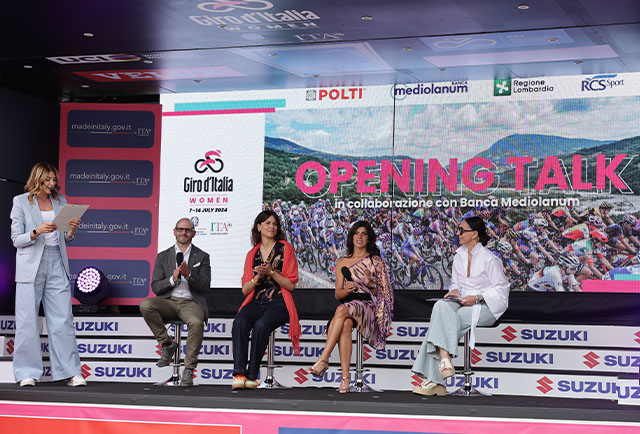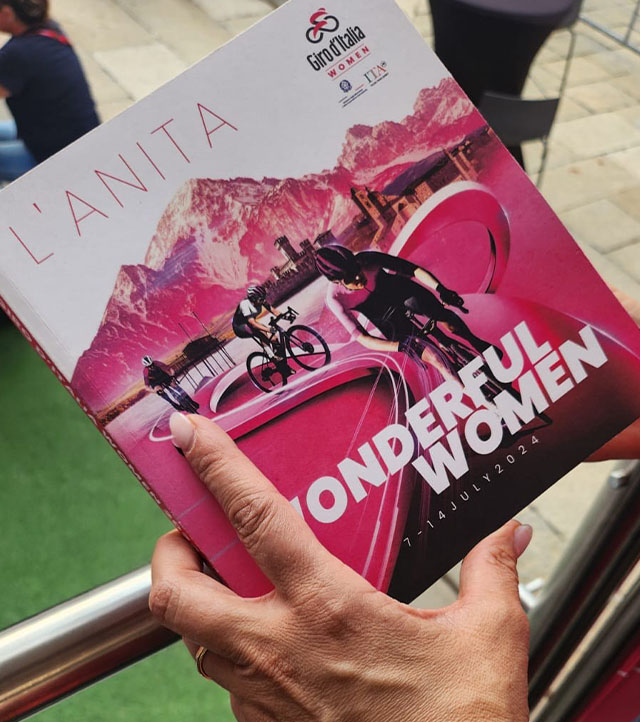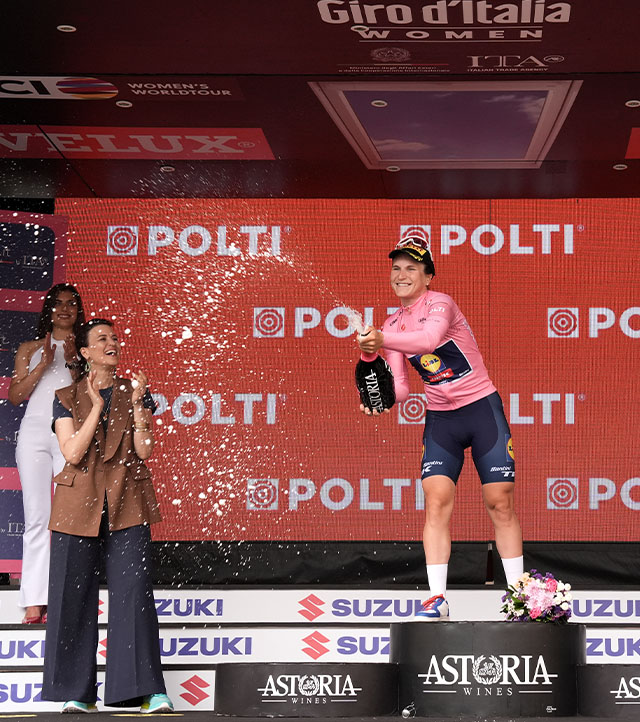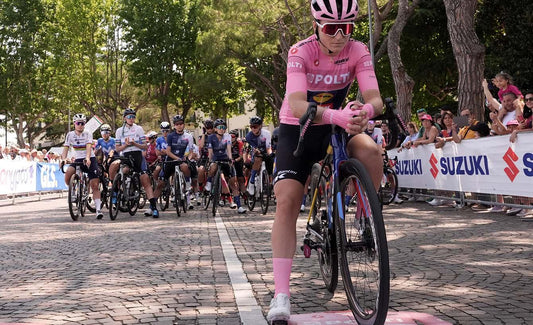July 6, 2024. Brescia. Piazza della Loggia, 5:30 p.m.
Thirty minutes before the presentation of the women's teams, the round table organized by Mediolanum begins, to which I am invited to participate, both because this year we are sponsors of the pink jersey of the Giro d'Italia Women, and because, as clearly emerges from the debate, there is a commonality of values that binds us to the world of cycling and that - also this evening from that stage - we reiterate.
Closeness to people, the lack of 'anti-cheering', the opportunity to believe in an aspiration, a dream - wearing the pink jersey for example - for everyone, men and women, so that gender barriers no longer exist, for equity understood as equal opportunities, valorisation of diversity and fair treatment.
There is also talk of “Alfonsina”, the first woman to have participated in the men's Giro d'Italia in 1924, challenging the clichés and being nicknamed “Queen of the Pedivella”. In commemoration of the centenary of this episode and in honor of this woman they called the highest peak of the race (on the Blockhaus) Cima Alfonsina Strada (called Cima Coppi in the men's Giro, Editor's note).
Applause and satisfaction.

I move to the hospitality area to fully enjoy the presentation of the teams and I am given L'Anita , the roadbook of the Giro d'Italia Women, in which you can find all the useful information to follow the stages... at first glance I smile reading the name, Anita, Garibaldi's wife...
The Garibaldi , in fact, is the roadbook of the Giro Uomini and was named thus by the commentator Martellini Nando in 1961 (the centenary of the unification of Italy) precisely because in that edition the Giro Guide had 'the hero of the two worlds' on the cover (the most romanticized version of the story says that the name is this because Garibaldi united Italy like the race that the guide talks about!).

July 7, 2024. Brescia Piazza delle Loggia, 11.35 am.
The first stage starts, an individual time trial entirely in the city in which the athletes challenge the drizzle and the cobblestones downhill from the Castle (mental note: come visit Brescia!). I have the opportunity, with my husband, to follow a runner, Elisa Longo Borghini, and appreciate her grit, perseverance and determination that will lead her to win the stage and wear the first Maglia Rosa Polti in history.
Being on that stage to award her was an honor, a great emotion; I perceived the satisfaction and pride of those who wear La Rosa .

July 11, 2024. Como.
I'm packing my suitcase. Tomorrow I'll leave to follow the last two stages of the Giro, the decisive ones, and I'll have the honor once again of awarding the winner of the Pink jersey, definitively. The winner of the Giro.
In these days I have been following the Corsa Rosa very closely. I followed the social media, I read the articles in the newspapers and I listened to the live TV broadcasts even if delayed. I appreciated the effort, the emotions, the passion of these cyclists but inevitably Michela Murgia also came to mind with her 'sexist Sunday review'. Murgia (and not Michela or La Murgia) compared the newspaper headlines and articles and the evident differences in how men and women were treated, in all areas, including sports.
And if it is obvious to read Pogacar and Vingegaard, it is not so obvious to read Longo Borghini, Kopecky or Zigart, it is much easier to find Elisa, Lotte and… Urska, or rather for her another name is used: Pogacar's girlfriend.
“But Francesca, are these the important things? You dwell (but who?) on these formalities instead of looking at the substance.”
Form is substance. And words are important, they define us.
And if I understand that in 1961 Alfonsina was called by everyone by her name because she was the only and first woman to do the Giro and now the Cima is named after her with her husband's surname, Strada (and not Morini as it was actually called), because it was 63 years ago, another world; and if I imagine that L'Anita has existed since 1988, the year of the first Giro Donne, at the height of the patriarchal culture in the style of the cine panettone, a period in which it would have been unthinkable to call the roadbook La Garibaldi (or De Jesus Ribeiro - her maiden name!), I have a harder time accepting that a professional athlete in 2024 is defined (only) by her name, with the article in front or as wife, mother, daughter, girlfriend of.
And like me, I know for sure, many athletes, many professionals, many women.
And it doesn't mean that the name can't be used, because if we use Cristiano in football, we all know who we're talking about, but if we say Elisa in cycling, it could be my cousin (hi Eli!) or the other dozens of Elises who run the Giro (I invite you to go and read the articles of these days and check Jasmine versus Sinner...).
It's like when suddenly in an important work meeting I become Mrs. Francesca and the colleague next to me is Eng. Rossi, regardless of their actual educational qualifications (a true story that repeats itself cyclically).
We are talking about breaking down gender barriers, breaking stereotypes and paradigms, giving equal dignity to each individual, regardless of gender (and ethnicity, age...). Maybe it is time to push this change also and precisely from words.
And to reflect on why we tend to call women by their first name and men by their last name, to define them with a role (mother, daughter, lover) instead of with a profession, there are deep-rooted and historical reasons, they are not trivial, knowing them helps us to overcome them.
With my suitcase closed, badge and Anita 🙂 with me, I leave with my best friends. We go to see two stages of the most beautiful Giro in the world in the most beautiful country in the world.


































































![Polti Cimex Eradicator [Renewed]](http://polti-me.com/cdn/shop/files/polti-cimex-eradicator-concentratore_1_2.jpg?v=1720597579&width=533)


























